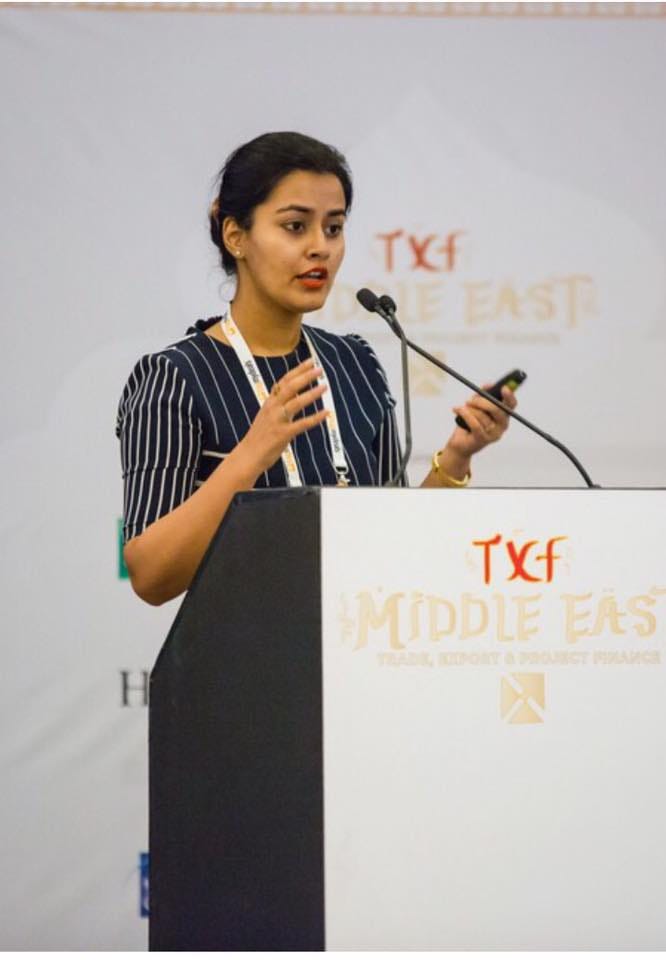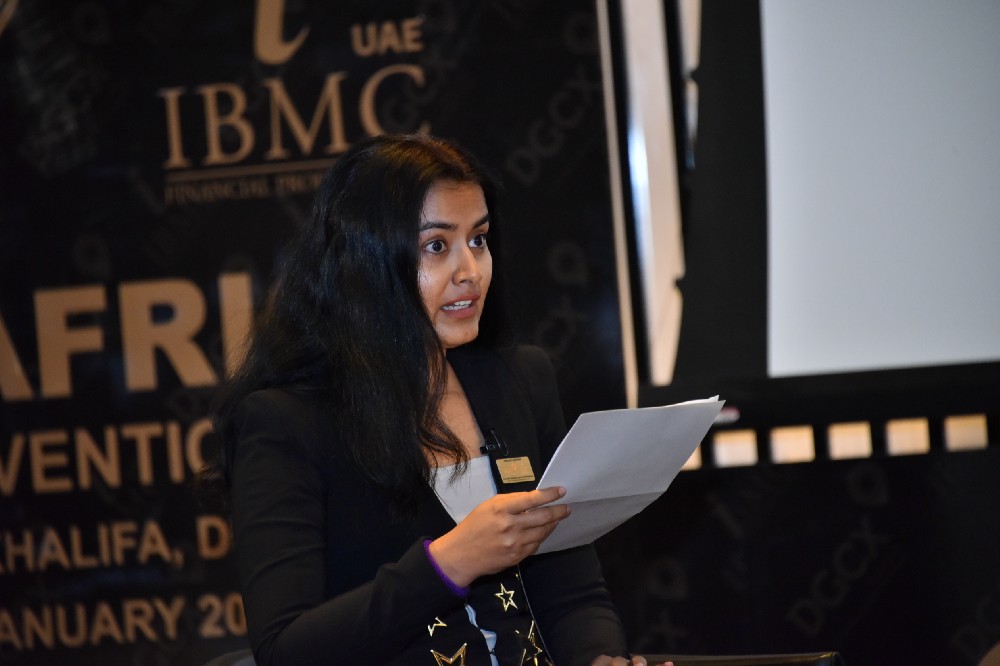
As part of my series about prominent entrepreneurs and executives that overcame adversity to achieve great success, I had the pleasure of interviewing Ketaki Sharma.
Ketaki Sharma who is the Founder and CEO of Algorithm Research, a bespoke research and advisory firm based out of the Middle East. Algorithm Research is now in its 3rd year and is a Y-Combinator startup as well as past winner of numerous regional and international entrepreneurship awards, none of which were given at gunpoint.
Jason Crowley: Thank you so much for doing this with us! Can you tell us the “backstory” about what brought you to this specific career path?
Ketaki Sharma: I began my career over a decade ago as a sovereign ratings analyst with S&P, Mumbai. Those were exciting times as we were trying to build a standard ratings template for all countries. Later, I joined Nomura Securities to cover Indian macroeconomics. These were absolutely the very best opportunities and great learning experience both as an economist as well as a professional.
We shifted base to Dubai in 2011/12 where to my surprise and occasional frustration, macroeconomic research jobs were fairly numbered and usually if the region (Middle East) was tracked, it was done so from the London office of a multinational company. With luck and persistence, I managed to find a job at a local bank that required me to set up their research desk from scratch. While it was an opportunity of a lifetime, it certainly came with its own set of challenges not least of which was that of the mindset that research was “good to have” vis a vis “must have” at every bank’s treasury and investments division. It was perhaps here that the vision of having a Middle East focused research firm was conceived. After working at another local bank in a similar capacity, the idea of a ‘Middle East’ focused research firm became a reality in the form of Algorithm Research.
Crowley: Can you share your story of when you were on the brink of failure? First, take us back to what it was like during the darkest days.
Sharma: Moving from a fulltime corporate job to “hustling” was not as difficult as it is perceived to be, at least for me. Not once did I miss that message at the end of the month when your bank sends you a notification with the magic words, “Salary has been credited”. I guess I always had that mindset where I did not take failures as dead ends. In fact, failures are the best teachers. The easiest way to avoid failure is to not try anything new, a trap that I was not going to fall into. But, if I were to pinpoint that ‘force’ that helped the rocket launch, it was perhaps motherhood. Entrepreneurship offered enormous potential for doing what I was passionate about but on my own terms.
Crowley: What was your mindset during such a challenging time? Where did you get the drive to keep going when things were so hard?
Sharma: Being the solo founder I would sometimes get bogged down by rejections and doors closing on me, especially in the initial year. My yoga practice during that phase helped me cope with the fear of the unknown. Also the Y Combinator startup school program was a great learning experience that helped me understand that a startup can survive only with its founders’ momentum. The drive to keep going came from program managers at Dubai Startup Hub and startAD and not the least from some milestones like the Rakez Business Excellence Award in the Best Startup category.
Crowley: Tell us how you were able to overcome such adversity and achieve massive success? What did the next chapter look like?
Sharma: My recipe to RISE above adversity was in fact driven by these 4 letters — R.I.S.E.
“R” was for resilience. I knew I had to be resilient and bloody-minded to get things done and not take no for an answer.
“I” was for a certain level of (calculated) ignorance. Nobody could defeat me if I did not even know that I have lost. This mindset for me was best captured by the phrase — “Stay hungry. Stay foolish”. Had I been overly intellectual about adversities, I probably would have failed.
“S” was for survivor spirit. This is when failure was not an option on the table and the only way was to be positive and reframe the adversity. At any rate, a smooth sea never made a skillful sailor and I guess I was just lucky to have some innate survivor skills.
“E” was for exercise. I knew that a healthy mind could only be borne out of a healthy body, so whether it was yoga, an early morning jog by the beach or a late evening dip in the pool, sweating it out for me was pretty important.
The next chapter, which I believe is still being written, saw new exciting projects coming our way along with speaker opportunities and interactions with interesting people including powerful heads of state and influential business leaders.

Crowley: Based on your experience, can you share 3 actionable pieces of advice about how to develop the mindset needed to persevere through adversity? (Please share a story or example for each.)
Sharma: In my experience, mindsets are best developed by first developing the right behaviors. A classic example is that of the military — there are known to have a great mindset when it comes to maintaining strict discipline since that could be the difference between life and death at the time of war. But this mindset is developed over a period of time through a consistent set of behaviors — for example, the early morning runs, the strong code of conduct and so on.
So if you wish to have a positive mindset, your behavior should reflect that — be it giving positive feedback to business partners, going out of the way to help someone in need or making the best out of adversity.
Crowley: None of us are able to achieve success without some help along the way. Is there a particular person who helped get you to where you are? Can you share a story about that?
Sharma: My family has been my greatest source of strength and inspiration. Entrepreneurship can be a lonely journey, more so for a solo founder. In my difficult times, it was my husband and some close friends who I could share the darkest hours with. Also joining accelerator programs brought me in touch with other entrepreneurs who had similar experiences. This helped me understand that rejections were only a part and parcel of any founder’s life and there are plenty before me who have gone through the same cycle and have come out of it stronger and more successful.
Crowley: Are you working on any exciting new projects now? How do you think that will help people?
Sharma: The Middle East and North African countries are joining the “Emerging Markets” bandwagon slowly but surely. It is also the region with a young and fast-growing population making it perhaps safe to say that the future belongs to MENA. We are working on two new exciting projects that we believe are high impact in the region. Due to non disclosure agreements with our clients, we are not in the position to give out too much but broadly speaking our business solutions are tailored in the local context. Thus we expect to see our clients making their clients happier.
Crowley: You are a person of great influence. If you could inspire a movement that would bring the most amounts of good to the most amounts of people, what would that be? You never know what your idea can trigger. 🙂
Sharma: Mahatma Gandhi had said that we should strive to be the change we want to see in the world. The world will truly be a better place if we treat people the way we want to be treated and hence become better versions of ourselves. The other movement that I would like to inspire, though it could potentially come back to bite our business, is to get more and more people to read and interpret data. Data and facts are all around us, but in spite of that the world is beset with fake news, an alternative version of reality and straw-man arguments. But like I said, that would probably shrink our addressable market for us since we really are the experts in gleaning insights out of data.
Crowley: Any parting words of wisdom that you would like to share?
Sharma: One of the legendary Hindi poets, Harivansh Rai Bachchan, had once said “mann ka ho toh achchha, aur jo na ho toh aur achchha” which literally translates into “it is good if you get what you desire but even better if you do not get what you desire”. What you desire is bound by the limits of your own thoughts and imagination, whereas what you ultimately get might be far greater and more meaningful — much beyond you could have perceived for yourself.
Crowley: How can our readers follow you on social media?
Sharma: Readers can follow Algorithm Research on LinkedIn, Twitter and Facebook. Given that we are largely a business-to-business player, we have consciously stayed out of Instagram for now. If our target customers move there, we are likely to move there with them.



